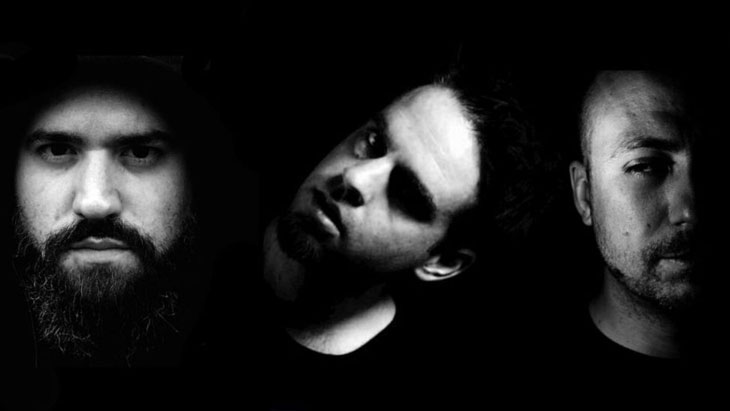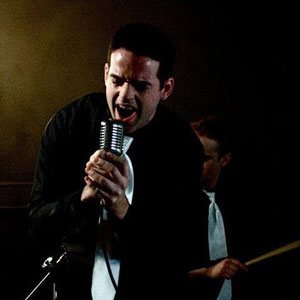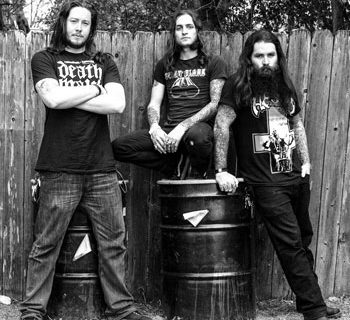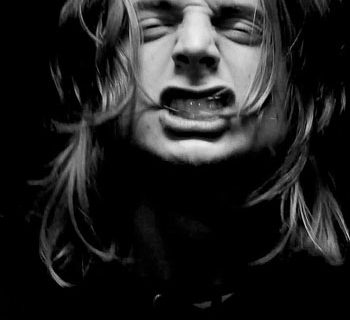Post Death Soundtrack, a trio from Canada, dropped its new, full-length album on May 27. Billed as a trip hop/psychedelic rock band, Post Death Soundtrack displays heavy doses of industrial rock, space rock, and subtle hints of jazz. Admittedly, from a stylistic perspective it’s a weird combination, but the result is unique, if perhaps a bit monotonous at times.
Post Death Soundtrack New Album, The Unlearning Curve
The Unlearning Curve contains nine tracks, most of which utilize sparse and sometimes contradictory lyrics cloaked in symbolic camouflage. The lyrical result is ascetic, austere, and simultaneously devout, like a Gregorian chant. But instead of conveying religious orthodoxy, the lyrics present a type of digital theology, where technology and machinery are the newest divinity.
The first track, “That Which Is,” is an amalgamation of psychedelic rock and space rock. Obviously influenced by David Bowie, the trippy melody provides a vehicle for the lead vocalist and his Bowie-esque cadence and articulation. This would get old quickly if not for the chanting background vocals that afford an antiphonal aspect. In other words, the tune works.
“You Can’t Go Back” is a psychedelic rock number, with industrial hints interspersed throughout. A simple melody, with a binary feel to it is made palatable by a splendid crying guitar that bestows a human touch to the song.
A flowing keyboard introduces “Our Time Is Now,” followed by plaintive vocals. Then, the melody segues into an industrial beat, which gives the number a machine-like pressure à la Nine Inch Nails. Only in this case the machinery takes over, leaving the number sounding as if a car was parked and left to idle.
“Beauty Eyes I Adore” changes things up stylistically. The introduction is acapella; then the instruments kick in, providing what can only be called psychedelic dance music mixed with a jazz beat. Fortunately, the drummer, or possibly a drum machine, does an admirable job and keeps the song alive. Frankly, it’s difficult to wrap one’s head around psychedelic dance music.
Industrial rock is an inherently superlatively tyrannical genre, of an inspired bestial nature that suggests mankind has been driven to its limits.
One of the more interesting tunes on the album is “Arrhythmia Dreaming,” an industrial rock tune straight out of the movie Metropolis. It’s robotic, enervating and dreary, depicting the mindless toil of human machines plodding through their daily routine.
Probably the best track on the album is “Little Alice,” a dark industrial piece replete with growling vocals. The beat thunks and clunks, while the melody cooks up a delightful and superb, if somewhat irascible complement. More of this type of thing rather than less would serve to make the album better.
The last track on the album is “Transform In White Light,” which is pretty much downtempo psychedelic-lite. The melody is catchy, but suffers from the repetitive lyrics.
“Dance With The Devil” and “Through The Gates” are little more than filler, tossed into the mix to make a full album. Both tunes are mish-mashes of industrial rock and trip hop and don’t deserve to be mentioned.
After listening to album, I realize that industrial rock is an inherently superlatively tyrannical genre, of an inspired bestial nature that suggests mankind has been driven to its limits. It’s feverish and insatiable, ever ready to devour its listeners, along with itself. And any band that approaches it prudently is going to get burned because industrial rock has to be dominated and forced to submit.
The Unlearning Curve exposes Post Death Soundtrack’s attitude as too tentative; tip-toeing around the beast looking for an advantage, while perhaps logical, simply isn’t practical. Because in the end, it all boils down to one thing: grabbing the tiger by the tail and hanging on.
5000 out of 10,000 Rawckus Kung-Fu Throwing Stars













